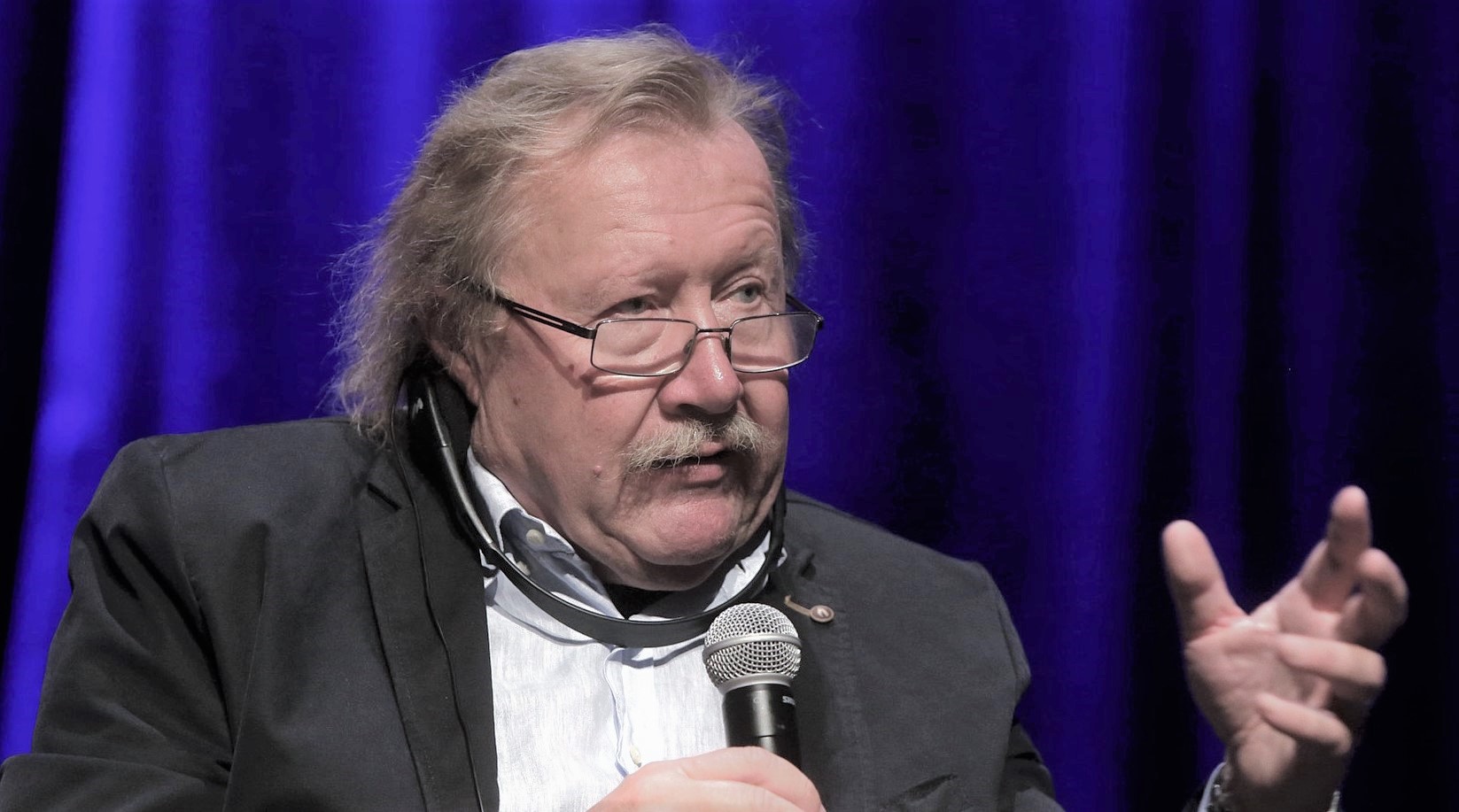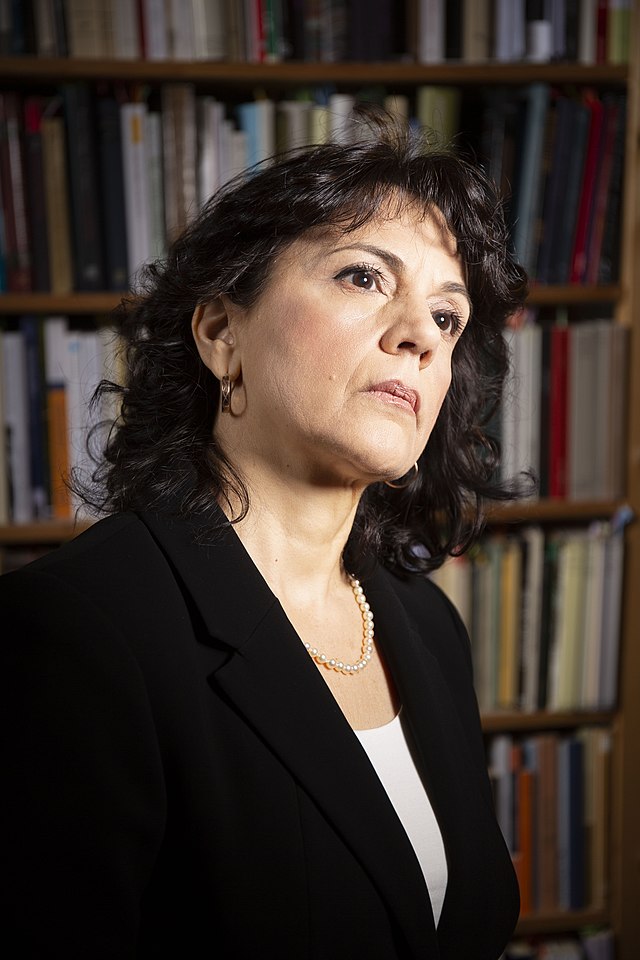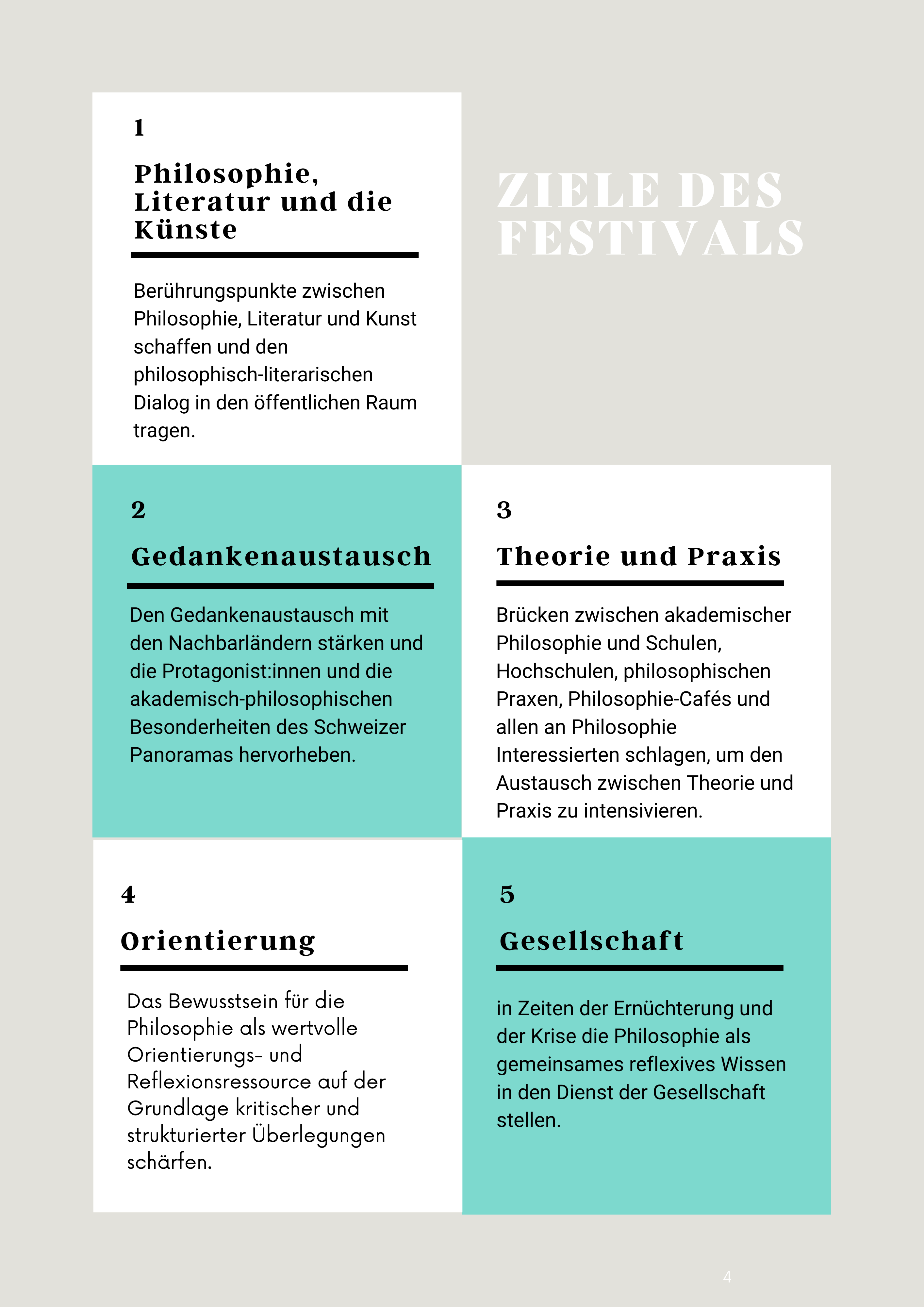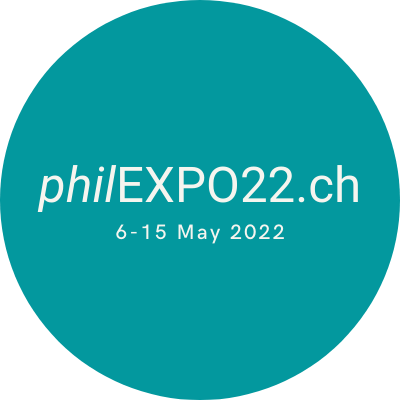Thank you!
The first philExpo - a week of philosophy in Switzerland - has ended. There were many opportunities for discussion, exchange, discovery and conversation on a wide range of historical and contemporary topics in response to the question "What do we want to know? We would like to thank all the participants, the speakers, the organisers and the many associations and institutes who contributed to make this rich week an extraordinary experience for many people.
1. the festival
PhilExpo22 - a week of philosophy in switzerland - from 6th to 15th May
During philExpo22, ideas were exhibited rather than objects or consumer goods that are the subject of exchange, barter and negotiation. The aim of the event was to create and offer spaces for discussion, dialogue, exchange and reflection in order to bring structured thinking in its dialogical form back to the centre of public discourse. Under the title "philExpo22.ch - Une semaine de philosophie en Suisse - A week of philosophy in Switzerland", the association Philosophie.ch launched a nationwide event that took place from 6th to 15th May. The initiatives organised as part of the event were aimed at all curious minds and involved researchers, teachers, students and writers. The "network" that made the event possible includes many people who practice, teach, disseminate or are simply interested in philosophy in Switzerland and neighbouring countries.
2. the theme
In a time characterised by diverse movements and changes on a global level, by disillusionment and polarisation, philosophy is called upon to redefine itself. The theme chosen for the event - "What do we want to know?" - reflects this.
The formulation of the question takes up Immanuel Kant's classic question ("What can I know?") and thus establishes a link to the eminently philosophical question of the modern object of knowledge. However, the question is directed at society ("we") and thus opens up the question of intersubjectivity on the one hand: Who is this "we"? On the other hand, the question challenges the will: What is the goal of this will, this desire to know? Can we agree together on priorities in terms of knowledge and research?
The choice of a very broad theme is due to the desire to carry out as many initiatives and activities as possible during the event. The event thus opens up a wide range of topics by bringing them to a common denominator.
A redefinition of philosophy is only possible if philosophers, writers, artists and all interested citizens find the opportunity to meet outside the institutional framework. The theme is therefore open to theoretical and historical topics as well as current issues. In addition to questions of the self, consciousness and the relationship to truth, it also addresses global issues such as climate change and its relationship to production systems, interspecies relations, the digitalisation of the world of work, communication and privacy, the current role of the European space and solidarity.
Faced with these big questions and the impact that the uncertainty of the times we live in has on individuals and communities, reflection - and collective action - becomes a necessity, an urgency. The need for reflection then leads to the desire to have the necessary space for the co-construction of new narratives that allow us to thoroughly rethink the structures and processes of knowledge and social practices.
3. the programme
The festival offered more than 80 events in (at least) four languages and was represented in all regions of Switzerland.

VERNISSAGE 06.05 - LA CHAUX-DE-FONDS
The week of events opened with a lecture by Peter Sloterdijk at Club 44 in La Chaux-de-Fonds. The German philosopher and essayist, considered one of the most important voices on the contemporary scene, is best known for his Kritik der zynischen Vernunft (1983) as well as the Sphären trilogy (1998-2004).
At the opening conference of the festival, Sloterdijk gave a lecture entitled "How the red of the East has become a cloudy grey in Europe. Reflections on the Political Theory of 20th Century Colour" (our translation). The philosopher spoke of grey as a metaphor, as an indicator of mood and as a signal of political-moral ambiguity in defence of the titular thesis for his book: Who has not yet thought grey.
Nordwestschweiz
Throughout philExpo22, interested visitors could visit the philoSOPHIA exhibition. It was divided into four sections: in the first section, it focused on the history of women's studies at Swiss universities (with a focus on philosophy) and dealt with historical beginnings of women at Swiss universities in general. The second section highlighted the underrepresentation of women in philosophy. The third section showed portraits of women currently active in philosophy in Basel. The fourth section included a compilation of video interviews. The exhibition could be visited at the Philosophicum in the Ackermannshof in Basel and was curated by Tanja Liebschwager and Chiara Monaco.
On Saturday, 7 May, two events took place at the same time. Also at the Philosophicum in the Ackermannshof, a seminar entitled "Wissenwollen, Wissensverweigerung, Wissensverwandlung" took place. Dr. Christian Graf and Dr. Stefan Brotbeck led the seminar.
The second event was the first of three productions of Plato's Allegory of the Cave in the Proserpina Grotte in Arlesheim. From 14:00 to 15:00, a group of students staged Plato's Allegory of the Cave as an immersive experience using drama, sound and video. In the staging, the participating persons have to persuade an acting person, who sits spellbound by shadows in the cave, to leave the cave by means of arguments. This staging also took place on Monday 9 and Saturday 14 May.
On 8 May, the philosophy didactics section of the FHNW offered a philosophical educational tour in a double-decker bus through Basel.
Under the title "Dialektik - anders denken", a Café Philo took place on Tuesday 10 May. Luka Takoa introduced the topic "Dialektik - anders denken" with an input. This was followed by an open discussion on the topic with the audience. The venue was the Labyrinth bookshop in Basel.
The very next day, another Café Philo took place from 12:00-13:00 at the Gymnasium Oberwil on the topic "Was wollen wir nicht wissen?". Together with interested people students and Marc-André Kaspar discussed the topic "Was wollen wir nicht wissen?" The winner of this year's National Philosophy Olympiad was also present.
On Thursday, 12 May, students of the Wirtschaftsgymnasium took a stand on the question: "Leben wir in einem aufgeklärten Zeitalter?" and discussed their position with an expert on modern media. Dr. Matthias Zehnder, author and media scientist specialising in interactive media and media philosophy, was invited as an expert. This was followed by an open discussion involving the audience. The panel discussion took place in the auditorium of the FMS Basel.
The philosophical practitioner Martina Bernasconi from Denkpraxis in Basel offered philosophical taster consultations that gave an insight into the field of "philosophical counselling". These could be attended on Thursday 12 as well as Friday 13 and Saturday 14 May.
For another Café Philo, Prof. Nicola Gess of the University of Basel introduced the topic of "Halbwahrheiten und Verschwörungstheorien" with a lecture. This was followed by a dialogue with the audience and Luka Takoa. The lecture and discussion took place at QuartierOase Bruderholz in Basel.
Region Zentral- und Nordostschweiz
Three events took place in the region of central and north-eastern Switzerland on Saturday 7 May:
The Facoltà Indipendente di Gandria organised a theatrical seminar, which took place from 14-16 at the Basislager.
Barbara Gavez and Dorothee Plancherel, gave a thematic input and led a discussion entitled "Miteinander reden lernen." The result was a Socratic dialogue attempt against the backdrop of the horizon of our times. This event took place in the rooms of the Museumsgesellschaft Zürich.
The Atelier für Kunst und Philosophie in Zurich offered philosophical and (interreligious) theological perspectives on wisdom in a panel discussion followed by a debate. Together with the panel, the discussion took place at the Atelier für Kunst und Philosophie in Zurich.
The ThiK Theater im Kornhaus Baden presented a discussion with Isabelle Bartram, molecular biologist at the University of Freiburg (D) and in the Gen-ethisches Netzwerk e. V. Berlin. Sandra Lang was the moderator. The audience followed the "expert talk", which lasted about 60', and asked questions afterwards. The discussion took place in the ThiK Theater in the Kornhaus.
In the Rathausmuseum Sempach, the Philosophy Department of the University of Lucerne organised a Living Library with 5 human "books" (Ph.students) under the title "Mythen und Held*innen in der Vergangenheit und heute" on: Nationalheld Winkelried, Archetypen, Antikes Heldentum, «Anleitung zum Held*in sein», Moderne Mythen / Urban Myths
On Monday, 9 May, the SW*IP (Society for Women* in Philosophy) invited to a lecture followed by a discussion on the topic "Doing Philosophy better". In English, the SW*IP presented the new guidelines that aim to make philosophy more inclusive. The lecture and discussion took place in the Kutscherhaus of the UZH.
The very next day, on Tuesday 10 May, the second part of "Doing Philosophy better" could be attended. From 3 p.m. to 7 p.m., a bystander training was offered, which was led by Dr. des. Deborah Mühlebach and Prof. Rebekka Hufendiek.
Also on 10 May, from 7:30 to 9 p.m., those interested could get to know the philosophy and the associated VHS course. This evening also marked the start of its module.
Also on Tuesday, 10 May, Imre Hofmann offered a metaethical examination with an introduction and a connection to contemporary debates. The workshop took place at the Kalkbreite Genossenschaft (Raum Flex 1).
The aki Zurich (Akademikerhaus der katholischen Hochschulgemeinde) invited to reflect on the topic "Infektion durch Megatrends und Dystopien" - lecture and discussion on trendy and apocalyptic discourses on the future and on openness and closedness of the future. The lecture took place on Tuesday, 10 May from 19:00-21:00 in the Foyer Pfarreizentrum Liebfrauen Zurich.
On Wednesday, 11 May, those interested were able to attend the lecture by Prof. Dr em. Hans-Dieter Mutschler on "Die Suche nach Transzendenz. Von der Religion zur Technik". The lecture elaborated on the ambivalence of the development from "higher, faster, further" to the new imperative with its advantages and disadvantages. The lecture took place at the UZH.
Organised by the Chair of Political Philosophy of the UZH, in cooperation with the Think & Do Tank Dezentrum, a scenario workshop on "Democracy Fiction - (Wie) wollen wir die Demokratie digitalisieren?" took place on Thursday 12 May from 19:30 to 21 (RAA-E-27, UZH Centre, Rämistr. 59).
On the same day, Thursday 12 May, Hans Joas referred to Max Weber's thesis in rich thought processes and showed that an alternative history of the sacred can also be written. In the process, a genuine cognitive value was revealed, which comes to light through the encounter with the unavailable. The panel took place at the Paulus Academy in Zurich.
Also on Thursday 12 May, Martin Götz explored an aspect from a philosophical perspective: How can or should society control the health of its members? This also requires asking what "health" means in the first place, especially in the global-historical situation in which the pandemic is taking place. The lecture took place at the UZH.
On Friday, 13 May, from 6:30 to 8 pm, two short lectures followed by a discussion took place at the Impact Hub Zurich - Colab. UZH Zurich & Meaning Quotient jointly addressed the questions "Do we know the role our values play in everyday business? (What is there to know, what should we know?)". On Saturday 14 May, Harry Wolf from philopraxis.ch presented an epistemological classification of reality escape with conspiracy stories, alternative facts and fake news. This lecture took place at the Kalkbreite Cooperative (room Flex 1).
On Saturday 14 May, a workshop was offered by the UZH Philosophy Department and the Philosophical Society Zurich. As part of this event in the main building of the UZH, a lecture by Prof. Dr. Veli Mitova (University of Johannesburg) was held on the topic of Epistemic Wrongs.
Bern und Region Bern
The first event in the Bern region already took place on Saturday 7 May. Prof. Dr. Markus Gabriel gave a lecture on the topic of "Ethik des Nichtwissens" followed by a discussion in the hall of the Farelhaus, Oberer Quai 12, in Biel-Bienne. This event took place as part of the 11th Biel Philosophy Days and was bilingual (German and French).
On the very next day, Sunday 8 May, the krino - Philosophische Gesellschaft Bern organised a panel discussion in a beautiful setting under the title "Das will ich gar nicht wissen!".
On Monday evening, 9 May, Detlef Staude from the philosophical practice philocom organised a philosophical café together with Andreas Heise. The topic "Was wir lieber gar nicht wissen wollen" was discussed.
Also on Monday, the student association of the University of Bern offered the Philo-Atelier, a philosophical workshop. There, students exchanged their thoughts on philosophical positions, arguments or their own works together with the audience.
The Université populaire Jura bernois organised a conference in Moutier with Juliette Catanese-Chassot on the topic "Giordano Bruno: Der Märtyrer des Unendlichen". The conference took place on Monday 9 May at 7pm.
On Tuesday, 10 May, from 12 to 14:30, an event with several philosophical practitioners from Switzerland was planned under the title "Beratung, Bildung, Alltag". It offered insights into the diverse approaches and activities in philosophical practice.
An SF PPP class (coached by D. Herzog (philosophy teacher) organised a Café Philo on Tuesday 10 May at 6 pm in the Bistro of the Gymnasium Thun, Schadau.
On the same evening, Prof. Dr. Dr. Claus Beisbart from the Institute of Philosophy at the University of Bern gave a lecture entitled "Wo das Wissen aufhört. Expeditionen zu den Grenzen des Wissens". The lecture took place at the University of Bern.
The programme continued on Wednesday, 11 May, at 7:00 p.m. with a panel entitled "Bildung, Weisheit und Freude am Lernen" with Christoph Reichenau, former President of the VHS Bern and the Volkshochschulverband, and Christina Cuonz, Director of Weiterbildung at the University of Bern.
forum3 also offered a panel discussion on Thursday 12 May from 7 pm: "Risse in der Gesellschaft. wahrnehmen - verstehen - überwinden". This event asked Rudolf Strahm, a long-time experienced political observer, and Elke Schlehuber, a practitioner in the design of change processes, about the perception and understanding of separation tendencies. The panel took place in room 101 of the main building of the University of Bern.
The Biel Philosophy Days showed the surrealist tragicomedy "Le charme discret de la bourgeoisie" by Luis Buñuel on Thursday 12 May at 8 pm. Following the screening at the Filmpodium Biel/Bienne, the audience had a discussion with PD Dr. Themelis Diamantis (University of Lausanne) moderated by Adrien Bordone. The film was shown in French with German subtitles. The discussion was held in French.
On 13 May from 4 to 10 p.m., pulp.noir invited visitors to the art installation "FULL DIALOG - Eine Anleitung zum Streit" at the Kornhausforum in Bern. On 14 May, the same exhibition could be visited again from 10 a.m. to 4 p.m. and at 8 p.m. the philosophy and talk show on the corresponding art installation began. The show is a plea for a constructive culture of debate.
The SW*IP (Society for Women* in Philosophy) held a workshop on feminist epistemology on Friday 13 May in room 115 of the main building of the University of Bern, which lasted from 2 to 4 pm.
The Theater am Puls TAP improvised at the Nebia poche in Biel on the theme "What do we (not) want to know?". The performance took place on Friday 13 May at 8 pm and was organised by the Biel Philosophy Days.
On Saturday, 14 May, there were two initiatives organised by the Biel Philosophy Days. At 12 noon, the boat left Biel on the trail of Rousseau to St. Peter's Island. There was a discussion in French of and with Rousseau's texts on Enlightenment issues with Dr Blaise Bachofen (CY Cergy Paris). Prof. Dr. Marie-Luisa Frick (Uni Innsbruck) later deepened the topic in German with a lecture on "Enlightenment thinking as inspiration and mission". The excursion in the footsteps of Rousseau ended at 5:45 pm with the return to Biel/Bienne.
In addition, the Philo-Speed-Dating (bilingue) took place at 6 pm: What do we want to know about the person vis-à-vis in 10 minutes? / What do you want to know about me? Two chairs, a table, a philosophical thinking note and off we go! The Philo-Speed-Dating took place in the hall of the Farelhaus in Biel-Bienne.
FINISSAGE 15.5. - Bienne

Donatella Di Cesare, Professor of Theoretical Philosophy at La Sapienza University in Rome, gave a lecture at the closing event.
As a columnist and author for various newspapers, Di Cesare deals with highly topical political and social issues and regularly intervenes in Italian and international public debate.
Her essays deal with topics in the history of philosophy (Heidegger, die Juden, die Shoah, 2016)) as well as political and social issues such as torture (Tortura, 2016) and terrorism in the age of globalisation (Terrore e modernità, 2017). Her work is known to the Swiss public primarily through the book Stranieri residenti. Una filosofia della migrazione (2017; in German: Philosophie der Migration, 2020).
The closing conference of the festival took place on Sunday, 16 May, at 12:00 in St. Gervais/Le Singe in Biel. The conference was organised in collaboration with the Philosophietage/Journé philosophiques de Bienne.
For information and contacts for Nordwestschweiz: andrin.kohler@philosophie.ch, for Zentral- und Nordostschweiz: gregorio.demarchi@philosophie.ch, for the Region Bern: marco.schori@philosophie.ch, for the project philExpo22: Ilaria.fornacciari@philosophie.ch.

